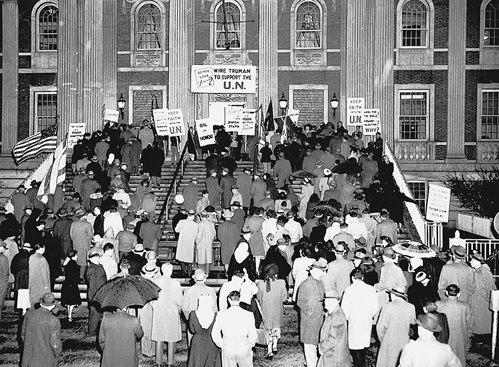
April 4, 1948
In March 1948, concerned that the conditions were not viable for partition as a result of ongoing violence between Arabs and Jews in Palestine, the US State Department shifted away from supporting partition towards the idea of a trusteeship. Among its concerns, the US was deeply worried that supporting the establishment of a Jewish state would jeopardize Arab oil supplies, force the US to send troops to save the Jewish state from defeat, and trigger a confrontation with the USSR in the region.
After a standoff between the White House and State Department over partition and trusteeship, on March 25, 1948, President Truman announced that the US believed in a trusteeship as a temporary alternative to partition stating, “Unfortunately, it has become clear that the partition plan cannot be carried out at this time by peaceful means. We could not undertake to impose this solution on the people of Palestine by the use of American troops, both on Charter grounds and as a matter of national policy.”
On April 4, 1948, in a memorandum from the US Joint Chiefs of Staff to President Truman three specific questions were answered: if the Jewish Agency and Arab Higher Committee agreed to abstain from further violence, it was estimated that 100,000 US troops, six destroyers and considerable air support would be necessary to monitor a truce. Second, if Britain agreed to participate in monitoring the truce, it was suggested that each country provide 50,000 troops. Third, what would the military implications be for the US? The answer included a partial mobilization of the Selective Service to achieve the numbers required. The US could not fully deploy forces before Britain’s scheduled withdrawal on May 15, because it would overextend US forces overseas and require a supplementary Defense Department budget. Though US policy in April 1948 was focused on reversing its position of four months prior that supported the establishment of Jewish and Arab states, the potential costs in US manpower and funds were so prohibitive that the Truman Administration could not have provided troops to stabilize the status quo and monitor a truce, even if Arabs and Jews had agreed to one.
The photo shows local residents protesting the President’s reversal on the partition plan outside the city hall of Schenectady, New York. Photo from the Daily Gazette.
